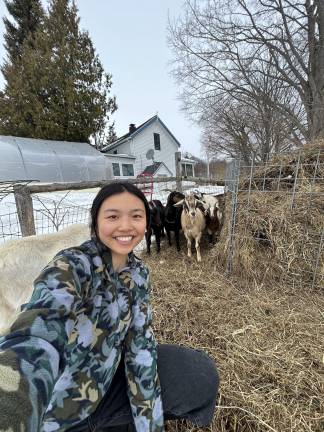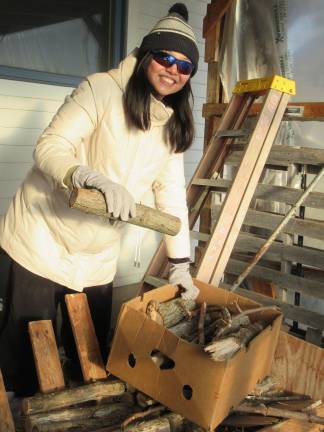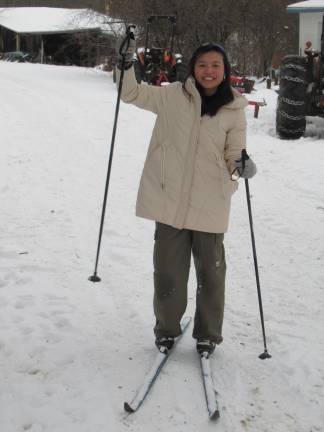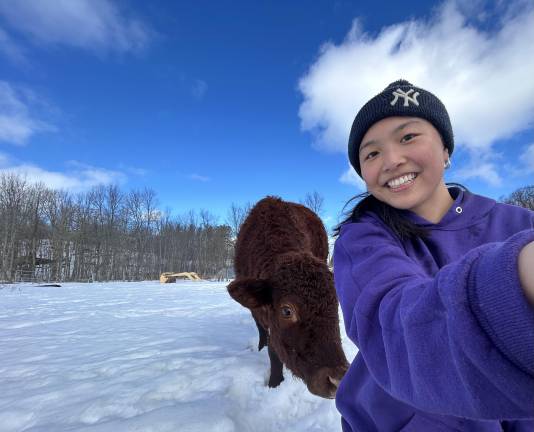Taking a breather from the Age of AI
After years spent with her head in software, a Yale computer science graduate sets out to understand more about the hardware — the earth beneath her feet




I grew up in Columbia, Missouri, a small city resting in the center of the United States — quite literally, as I lived an hour’s drive from the geographic center of the country. My parents, both of whom immigrated from China for graduate school, built their lives through school and hard work, and they raised my brother and me with the same mindset. Academics and extracurriculars always came first. Weekends weren’t for hanging out with friends but for getting ahead. They often spoke about their high school and college rankings and the importance of academic achievement. It made sense in the context of their childhood — it was their path to freedom, the way they immigrated to the United States.
My mother was a patent attorney. My father is a professor at the University of Missouri. When people ask why he stayed in Columbia, he will joke, “Because it’s boring. Can focus better on research.”
Growing up, I mostly followed the structure my parents had set for me. I didn’t really question it. Up until high school, I was usually the only Asian in class. I realized it on the first day of kindergarten, and the feeling of not quite belonging has stayed with me ever since. The pandemic unexpectedly gave me the time and space to form deep relationships with friends and binge media I might not have otherwise, giving me the distance to step outside my parents’ direction. Still, I relied heavily on my parents’ input when deciding my major.
I started out pre-med, but I knew I would never be disciplined enough to get through the curriculum in a way any doctor would consider healthy. I thought about English, but after burning out from high school journalism — and with my father warning me against entering a “sunset” industry — I decided against it. All my life, I’ve felt like I’m standing in front of Sylvia Plath’s fig tree — once watching the fruit shrivel and drop in despair, but now learning to embrace the uncertainty. At the time, though, I was paralyzed.
To help me make up my mind, my father loaded up his presentations on computer science and economics. My mother suggested I follow in her footsteps and become a lawyer, but after high school debate, I was afraid I would have to spend my whole life arguing.
Ultimately, I chose computer science — if nothing else, I knew I’d rather solve puzzles than talk about money.
The machine mindset
There were parts of the computer science major that I enjoyed. Studying CS trained me to think systematically. It taught me how to break down complex problems, map out solutions and work toward an end goal. It also demystified technology for me. I used to stare at my computer, wondering, How the heck does it do that? How could I just type in a URL and land on a website? What was actually happening behind the scenes?
For a while, I thought I would go into Big Tech. I believed that if I worked hard enough, if I kept pushing, one day I’d make it — that it wouldn’t always feel like a never-ending race. I interned, attended hackathons, drank bottles of Soylent instead of lunch and pulled all-nighters. But with the advent of AI, I realized that the idea of things ever getting easier was just a fantasy, at least in Big Tech. It would only get harder, faster. Success meant becoming more machine-like—more efficient, more optimized, more willing to sacrifice the human parts of myself in the name of progress.
Because the reality was, a new feature became old within weeks, and there always had to be something new. If you weren’t pushing forward fast enough, people lost interest. And as technology accelerated, so did expectations. Progress for the sake of progress. Innovation for the sake of innovation. In class, we debated what would come next. We just passed the Internet Age. Now we are in the AI Age. After AI, what’s next?
Some theories ranged from brain chips to the metaverse to space exploration. I knew one thing: I wouldn’t live in the metaverse. As for brain chips — well, if everyone else got one, maybe I would, but I had no desire to be the one developing them. Space, on the other hand, actually seemed exciting — until I read The Three-Body Problem and became convinced it would also lead to humanity’s downfall. I needed a break.
So after graduating, I came to Cross Island Farms, an organic farm on an island just on the New York side of the border with Canada. I told my friends I was going to “touch grass.” After years spent with my head in software, I wanted to understand more about the hardware — the earth beneath my feet, the systems that actually sustain life. I felt like I lacked perspective, and this seemed like the place to find it.
Early-rising farm days
My mornings begin early. Farmer Dani, with eyes as clear and bright as a winter sky, likes to wake up before the sun.
It’s funny to think about how I ended up here. When I first found Cross Island Farms on WWOOF.net (a website to match host farms and volunteers), it was a desperate attempt to leave home.
After graduation, I felt myself slipping back into my high school self, unmoored and restless. Plus, it was a childhood dream to work on a farm. I needed structure, something tangible. So at night I sent out 10 requests (the website’s daily limit) and waited.
Dani Baker was the first to respond — at 4 a.m. “Please call us at 315-482-3663 to find out more about what your stay here would be like and to see if it’s a good fit...” she wrote. I called immediately. I had just returned from China and was still jetlagged. She, on the other hand, just liked to start her mornings early.
I pause by the woodstove, hovering my hands over its warmth, feeling a quiet satisfaction in knowing where that wood came from. A few days earlier, Dani’s husband Dave Belding and I went into the forest searching for dead ash trees. We looked for trees missing small twigs and showing telltale signs of emerald ash borer infestation, tiny holes left by larvae burrowing beneath the bark.
Once we found a suitable tree, I watched as Dave, a professional machinist as well as a farmer, chainsawed an angled notch into the trunk, ensuring it would fall safely. Things didn’t go as planned. It wedged itself awkwardly between two tree branches, refusing to fall cleanly. Dave tried different methods, explaining the forces at play — the weight distribution, the tension in the branches, how we should leverage gravity’s pull. After some careful maneuvering with the tractor, he finally pulled it free. Later, we measured the pieces, stacked them in the wagon, and loaded them into the house. Now, as I warm my hands by the stove, I can trace the entire journey of that heat from the forest to the fire, a process I had never thought much about before.
Then I grab a cup of coffee and settle by the kitchen window, watching the sun rise over the snow. Every sunrise is different, a quiet reminder that time moves forward in its own way. The colors —soft pinks, fiery oranges, deep purples — stretch across the sky and reflect onto the snow, tinting the landscape in a fleeting glow.
After breakfast, the farm work begins. I start with the birds. First, the bird feeder — I’ve learned what suet is and which birds prefer it. Woodpeckers, in particular, rely on suet as a high-energy food source, especially in winter when insects are scarce. Their chisel-like beaks make quick work of the dense fat, fueling their constant movement. The red-bellied woodpecker, despite its name, doesn’t actually have a red belly, but the name “red-headed woodpecker” had already been claimed. Blue jays are much bigger than I expected, their striking blue feathers standing out against the snow. Once, Dani counted 12 gathered by the feeders.
Then I move on to the other birds — the chickens and ducks. The ducks are impatient, quacking relentlessly no matter what. The chickens are cuter, so I feed them first. I check for eggs, which are a delicate shade of blue, and they taste better than any eggs I’ve ever had.
Next are the goats and cows. It’s funny watching them curled up, lazily chewing their cud. Dave taught me about rumination, something I’d heard of but never really taken the time to observe. Their stomachs work in stages, breaking down food slowly and methodically. There’s something soothing about it.
Then come the heifers. The two young cows wait by the watering tank, eager for hydration. One even kisses my hand as I reach out the tube to give them water. They jostle for the first drop of water — the black one, slightly bigger, almost always wins.
The pigs come next, and to be honest, I’m not their biggest fan. They’re always underfoot, nosing around and trying to bite me, forcing me to swat at their snouts to keep them in check. But I have to admit, they’re fun to watch. They’re energetic and playful, doing little spin moves whenever the tractor comes around. What intrigues me most is their faint, almost maple-like smell.
Finally, I check in on the male goats and the rest of the cows, including the pregnant ones and the bull. The bull has been a problem lately. He jumped the fence once, setting off a chain reaction of escape attempts. We’ve had to round up cattle and reinforce fences more than once.
Dave has plenty of stories about cows escaping, always punctuated with one of his sayings: “A fence that will hold water will hold a goat or a cow.” He has a whole collection of sayings.
“Anything that can go wrong will go wrong.” Murphy’s Law — though Dave likes to add, “It will go wrong at the worst possible time.” One day, he introduced me to the word blivet: “when you try to stuff ten pounds of manure into a five-pound bag.” It’s a good stand-in for a curse word.
And another: “Happiness is a full wood rack.” But my favorite? “What grows in the ground, Dani takes care of. What poops on the ground, David takes care of.”
Finally, I head back inside and wrap my hands around my second warm cup of coffee, observing the heat slowly return to my fingers. Then we move on to the plants. My task is to water them. I remember the day we planted them, filling cartons with living soil, rich with microbes that sustain growth. We dropped tiny seeds into place: purple kale, regular kale, Brussels sprouts, Lincoln leeks and all sorts of onions.
Dani has taught me more than I ever expected to learn about growing food — how much to water, what temperature the plants need to be at different stages, how to transfer them without shock, how to prevent the roots from spiraling so they don’t become tangled and stunted. In just two days, we see green — the onions breaking through the soil. I notice a tiny black dot clinging to the tip of a sprout. That’s the seed, Dani tells me. It’s strange and beautiful, the way something carries the remnants of its beginning as it grows.
We water. We wait. And then we cook. Dani and I have cooked several meals together — cheesecake, leek casserole, hearty stews, liver and steaks. We’ve also made hummus, and I’ve discovered my new favorite kitchen tool: the immersion blender. It’s stronger, more versatile than a regular blender.
Some meals I eat slowly, savoring each bite. Other times, I’m so hungry I just inhale my food. As we eat, Samba curls up beside me, breathing peacefully, her poses always wacky — hind legs on the couch, front paws dangling, or sprawled in some impossible position. Sabrina lingers nearby, letting out soft snores like a tiny idling engine. “Funny dogs,” Dave likes to say. Savannah, the cat, nestles in my lap, her gray fur warm like a well-worn sweater. And that’s more or less my day at Cross Island Farms.
The take-home
My farm internship has challenged me to be more attentive, more deliberate, and more aware of the living earth around me. The work here requires patience and presence. Nothing is abstracted away. Dani and David built this farm not by optimizing every process, but by understanding the land itself. They know when to plant, when to harvest, when the soil needs rest. They don’t rely on automation to think for them but on years of observation, trial and error, and a deep respect for nature’s rhythms — a respect rooted in their continual effort to try and understand it.
That’s one thing technology will never be able to do: truly understand. It’s a uniquely human ability, though not everyone chooses to engage with it. Humans exist somewhere between animals and machines, but we are neither. Like animals, we can follow instinct. Like machines, we can chase efficiency, stretch our time and push our limits.
But what if we took a different path — not one of survival or optimization, but of understanding? Looking both inward and outward, making sense of ourselves as much as the world around us? Or maybe I think too much. Maybe it’s not that deep. Or maybe it is.
As for me, my next step is home, to spend time with my family before moving to Boston to teach. My time on the farm gave me the courage to commit to pursuing teaching, but in reality, it was always there. I loved being a teaching assistant and felt more at home in the teaching community than in my major classes. I want to teach computer science or math, or maybe something else. I’m still figuring that out.
I’ll be living with my college friends, who I’ve missed dearly — and hopefully, this time, we won’t be surviving on granola bars and struggle bus meals.